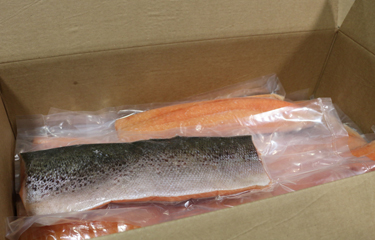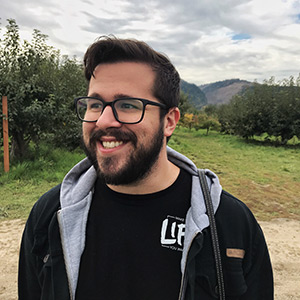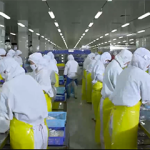Samuels and Son beginning AquAdvantage salmon sales this month

Samuels and Son Seafood plans to begin selling the world's first publicly-available genetically engineered salmon this month.
The Philadelphia, Pennsylvania, U.S.A.-based wholesale restaurant supplier is thus far the only company to publicly announce its decision to sell AquaBounty Technologies’ genetically-engineered AquAdvantage salmon, and it is proud of that distinction, according to Samuels and Son Director of Purchasing Joe Lasprogata.
“We’ve been pretty clear from the beginning that we’re supportive of this project that AquaBounty is leading, and that we’re excited to be able to introduce it to consumers," Lasprogata told SeafoodSource. “We feel like this is going to be a very important product in the future.”
Lasprogata said the success of the product, like any other, will be determined by customer preference.
“We have 15 to 20 brands of salmon, and every customer has their specifications,” he continued. “Once we get it in and start selling, it will be up to our customers whether or not its successful. There are always a lot of new seafood products out there – some stick and some don’t. We always want to give interesting ones a shot.”
Lasprogata said Samuels and Son plans to start handling AquAdvantage salmon like any other new product – taking in about 1,000 pounds twice a week.
Aquabounty Technologies has received pushback on its GE salmon product from environmental groups, NGOs, and some politicians, but Lasprogata said feedback on his end has been relatively quiet.
“There have been a few emails and phone calls from people who are disappointed we’re handling this product, mostly from the general public,” Lasprogata said. “Those people are just concerned and have misinformation about the product and bioengineering in general. I’ll take those calls and relay correct information on the product. I can’t say I’ve changed anyone’s mind on it, but we’re getting facts out there.”
In late July, Jaydee Hanson, the policy director at the Center for Food Safety, urged subscribers to the anti-GMO non-profit's mailing list to contact restaurants supplied by Samuels and Son and urge them not to purchase AquAdvantage salmon. Restaurant chains supplied by Samuels and Son include McCormick and Schmicks, Morton’s Steakhouse, and The Hard Rock Café.
“Your advocacy has already convinced more than 80 food companies like Kroger, Trader Joe’s, and Whole Foods to pledge never to sell GMO salmon. Now we’re asking the restaurants that get their seafood from Samuels and Son to make the same commitment,” wrote Hanson. “This GMO salmon is the first-ever GMO food animal, but if we don’t get Samuels and Son Seafood clients to take a stand against it, it may not be the last.”
It isn't just NGO opposition that the company may have to face. U.S. Rep. Don Young (R-Alaska) has introduced H.R. 273, the "Prevention of Escapement of Genetically Altered Salmon in the United States Act," to the legislature. Currently, the act is worded such that it would prohibit anyone from shipping, transporting, offering for sale, selling or purchasing, a "covered fish" in interstate or foreign commerce. A "covered fish" in this instance is any finfish alive or dead – including gametes, fertilized eggs, offspring, and descendants – that has undergone genetic engineering.
The FDA first approved the sale of AquAdvantage salmon in 2015, an approval that was met by immediate lawsuits by multiple organizations. Federal judges have also criticized the FDA on multiple occasions for its handling of the evaluation of product. But the legal pushback against the product has been on the basis of environmental issues and has not been related to food safety concerns, AquaBounty has said.
In response to the controversy, potential legislation, lawsuits, and the few concerns voiced by his customers, Lasprogata said he hopes people keep an open mind.
“I just hope people try it and give it a fair try and really understand it,” he said. “People need to understand where we are, as a civilization, and where we are with resources globally – we need to be able to produce more food like this sustainably and efficiently. I think this is just the first product of many [like it].”
Photo courtesy of AquaBounty






Share